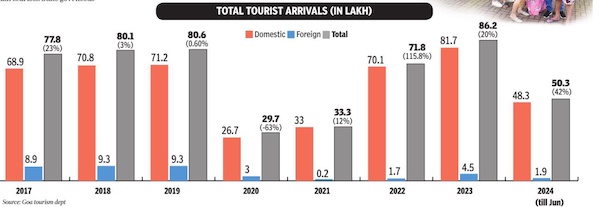Goa: Tourism
This is a collection of articles archived for the excellence of their content. |
Contents |
Casinos
2020: Ban on locals
Why Goa has banned Goans from entering its casinos, February 5, 2020: The Times of India

From: Why Goa has banned Goans from entering its casinos, February 5, 2020: The Times of India
Backed By All Main Political Parties With An Eye On Votes, Here’s What The Bid To Keep Locals Off Gambling Means For The State
The Goan government banned locals from gambling in 14 casinos located in the state — six offshore, eight onshore — from February 1. Chief minister Pramod Sawant attributed the decision to a rise in gambling and said it was to save the “local culture”. The issue has acquired political overtones over the years with the two main parties in the state — BJP and Congress — playing to the gallery and assuring that locals would be banned from them.
The first casino in Goa was opened in 1999 under the then Congress government, which amended the Goa, Daman and Diu Public Gambling Act to give licenses to one offshore casino and a string of five-star hotels. The Congress government during 2007-12 granted licences to seven more offshore casinos, of which only four remain now.
While the rules enforcing the ban are yet to be framed, Goa is not the only state where locals have been barred from casinos. In Sikkim, the only other state with casinos, locals are not allowed entry in them in order to “safeguard the interest of the local people.” In Nepal, the government banned its citizens from entering casinos in 1977 — again, seemingly, to prevent people of an impoverished country from blowing up their hard-earned money. Prior to that, Nepalese citizens were allowed entry into casinos upon payment of Nepalese Rs 50 at the entrance. Even countries like Macau, South Korea and Vietnam have banned locals from entering casinos. Singapore, which hiked the casino entry fee for citizens from S$100 to S$150 per day, saw no decline in the numbers of locals willing to gamble.
According to a recent study, nearly half the men in Goa engage in some form of gambling. The study published in the Asian Journal of Psychiatry said that lotteries and matka, which are banned, were the most popular forms of gambling. Interestingly, just 1.1% of the respondents said they had visited the casinos where gambling was permitted.
Past CMs Manohar Parrikar and Digambar Kamat had promised a casino ban for locals and in June 2015, the state home ministry had first drafted rules providing for the arrest of any person under 21 years of age and any Goan, irrespective of age, found gambling in a casino in the state. But the file could not cross bureaucratic hurdles. Under the draft rules, the state home ministry had given powers to the state to appoint a gaming commissioner, who could be a private person or a government officer, who would be provided logistic support, including staff. Social groups and NGOs, too, have long protested against the Goan casinos.
On an average, 8 million-plus tourists visit Goa each year, of which nearly a million are foreigners. A sizeable chunk of these foreign tourists visit casinos. The state government collected Rs 411.44 crore as revenue in 2018-19 from onshore and offshore casinos. With its outstanding liabilities at over Rs 22,000 crore and the state also facing a 30% shortfall in GST collections, the casino ban for locals represents an additional shortfall for the state coffers.
Statistics
Foreign charter tourist arrivals
2019 – 2023

From: Nov 11, 2024: The Times of India
See graphic:
Foreign charter tourist arrivals in Goa, 2019 – 2024 Jun
Tourist arrivals in Goa
2017- 2024

From: Nov 11, 2024: The Times of India
See graphic:
Tourist arrivals in Goa, 2017- 2024 Jun